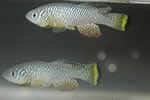- Science & Research
- Science News
- Newsletter
- 2006
- February 7

Newsletter
Newsletter
Resveratrol extends lifespan of vertebrate
 | ||||||||||||||||||||||||||||||
| ||||||||||||||||||||||||||||||
| ||||||||||||||||||||||||||||||
| Life Extension Update Exclusive
Resveratrol extends lifespan of vertebrate You've head about the ability of resveratrol, a compound found in grapes and other plant foods, to extend lifespan in yeast, roundworms and fruit flies. Now researchers in Italy have shown that resveratrol can extend the lifespan of the vertebrate Northobranchius furzeri, a small fish with a maximum lifespan of 13 weeks in captivity. The research was published in the February 7, 2006 issue of the journal Current Biology. Alessandro Cellerino of the Scuola Normale Superiore in Pisa and colleagues added three concentrations of resveratrol to the food of 110 four week old fish, while 47 fish received standard diets. Thirty fish received diets containing 24 micrograms resveratrol per gram of food, 60 received 120 micrograms per gram, and 20 fish received 600 micrograms per gram. The fish were not allowed to eat unlimited amounts of food, but were fed a defined amount twice per day. The scientists found that while the control fish lived life spans comparable to untreated fish, supplementation with resveratrol resulted in a dose-dependent extension of median and maximum life span. The 120 microgram per gram food dose of resveratrol was associated with an increase in median lifespan of 33 percent and a 27 percent extension of maximum lifespan, while the highest dose of resveratrol elicited a 56 percent increase in median and 59 percent increase in maximum life span. Resveratrol-treated females continued to lay eggs and males were still able to fertilize eggs at 12 weeks of age after all of the control fish were dead, and these eggs developed into normal adults. Control fish showed a reduction in spontaneous swimming at nine weeks of age compared to five week old fish, revealing a reduction in locomotor efficiency, yet there was actually an increase in swimming performance in resveratrol-treated fishes until ten weeks of age. Cognitive performance, as evaluated by task learning, was also shown to decline in nine week old compared to five week old control fish, but in fish treated with the 120 microgram per gram food dose of resveratrol, the age-dependent reduction was completely prevented. In addition, the resveratrol treated fish showed an absence of neurofibrillary degeneration, which was present in nine week old, but not five week old control fish. These findings led the authors to question whether life extension induced by resveratrol could be the result of a protective action on the nervous system. In answer to how resveratrol works, the authors write that the mechanisms aren't clear, but conclude that "the observation that its supplementation with food extends vertebrate lifespan and delays motor and cognitive age-related decline could be of high relevance for the prevention of aging-related diseases in the human population." Age-associated mental impairment An aging person often experiences a progressive decline in cognitive function. This typically begins with short-term memory loss and the inability to learn new information. Simple memory deficits, if not addressed, can worsen over time. Numerous published studies indicate that brain aging can be controlled, at least in part. Some of these research findings demonstrate a preventive effect, whereas others show a benefit in reversing the neurological impairment caused by normal aging or by an age-related condition such as having had a stroke. Conventional medicine has little to offer for people who notice a small decline in their memory or mental abilities. Often these changes are attributed to being a natural or inevitable part of growing old. Alternative physicians advocate that people should take responsibility for their own intellectual health as soon as possible, certainly before minor symptoms progress to a pathological illness. The benefit of taking several different types of agents that protect and enhance neurological function is that these same agents can also prevent age-associated diseases from manifesting in other parts of the body. Nutrients such as coenzyme Q10, acetyl-L-carnitine, and ginkgo, along with hormones such as DHEA, melatonin, and testosterone, can provide dramatic systemic antiaging effects. A massive body of published scientific research indicates that one can take steps to boost cognitive function today, while simultaneously reducing the risk of Alzheimer's disease, stroke, and other degenerative brain diseases. https://www.lifeextension.com/protocols/neurological/age-related-cognitive-decline Featured Products Life Extension Magazine February 2006 Aubrey de Grey, PHD: An exclusive interview with the renowned biogerontologist, by Ben Best The author of The Mitochondrial Free Radical Theory of Aging, Dr. de Grey has moved beyond trying to understand the causes of aging or finding means to slow aging. His current focus is rejuvenation. He believes that within 30 years, it may be possible to rejuvenate a 50-year-old individual to such a youthful condition as to allow him or her to live to the age of 130. He believes that comparable rejuvenation technology for a mouse may be discovered within 10 years. Dr. de Grey believes that the key to rejuvenation is the repair of seven distinct kinds of damage that represent aging: cell loss, cell senescence, extracellular protein cross-linking, nuclear DNA mutations, mitochondrial DNA mutations, and the accumulation of "garbage" inside as well as outside cells. He has characterized the repair of these seven kinds of damage as Strategies for Engineered Negligible Senescence (SENS). https://www.lifeextension.com/magazine/mag2006/ | ||||||||||||||||||||||||||||||
If you have questions or comments concerning this issue or past issues of Life Extension Update, send them to ddye@lifeextension.com or call 1-800-678-8989. For longer life,  Dayna Dye Sign up for Life Extension Update at https://mycart.lifeextension.com/subscribe.asp Help spread the good news about living longer and healthier. Forward this email to a friend! View previous issues of Life Extension Update in the Newsletter Archive. | ||||||||||||||||||||||||||||||
The latest news on aging, nutrition, and vitamins
Lab
Testing
How Life Extension lab testing works



